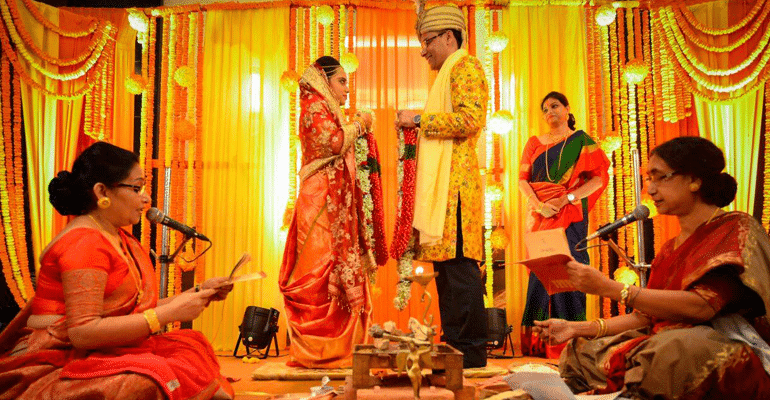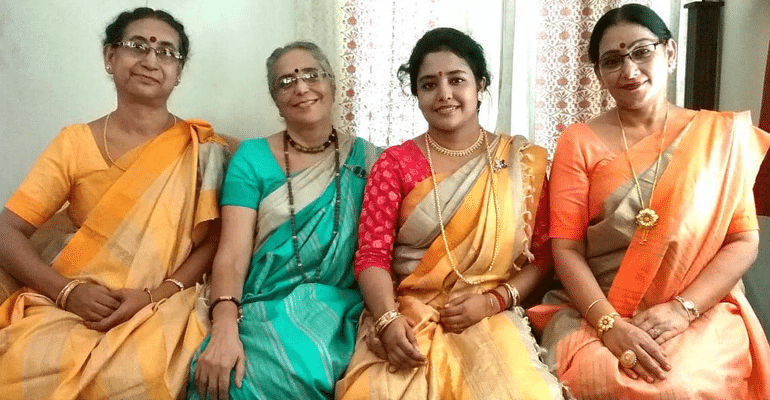The more we accept the fact, the better it will be! We live in a country where rituals are cruel to women. Hard to believe? Let us start with the obvious- check out the matrimonial ads in the newspapers, if you are a man and searching for a woman partner, there are high chances that you will come across a typical ad saying- “ফর্সা সুন্দরী অসবর্ণ গৃহকর্ম নিপুনা সরকারি চাকরি চলিবে” (Looking for a fair, beautiful, inter-caste, knows household chores and has a government job)
This is what a woman has to fit in if she wants a good match for herself, and the question is, will that be enough for a man to get married to a person?
Kolkata’s priestess, Nandini Bhowmik, in a heart-warming conversation with LifeBeyondNumbers says why the Sanskrit hymns she utters has no place for “kanyadaan” and this tradition is no excuse for biases against women. From being a professor to a female Purohit, life has not been easy for this 58-year-old Sanskrit professor, but breaking rules and inviting change can lead to happy beginnings is what she believes with all her heart.
About 11 years ago, this Kalighat-based Sanskrit professor realized that there was absolutely nothing in the religious text Vedas that excludes women from practicing religious rites. Nandini says, “A woman can be a purohit and can solemnize religious ceremonies.”
“When I was young, there were many conservative ideas that shaped my thinking and later, I had to figure out my set of rights and wrongs. Since the Vedic age, we Indians have blindly practiced numerous traditions without asking any questions, but the cultures have transformed itself through ages. If you look at the present society, young couples those who want to get married, they exactly want to know what they are saying and what they are doing, why they are doing and it is the responsibility of the priests to satisfy them.”
Nandini was inspired by her Sanskrit teacher Gouri Dharmapal, the first woman purohit who invented a very beautiful method of uttering the Sanskrit hymns in a shorter and simpler method along with translations. Nandini now has a team and it’s more like a family now. She performs along with her co-priestess Ruma Roy and there are 2 vocalists Seymanti Banerjee and Poulami Chakraborty who sing songs of Rabindranath Tagore, while they utter the beautiful Sanskrit slokas. That is how they solemnize a wedding now. Songs like “Aamra dujona sworgo-kheloa goribo naa dhoronite, Mugdho lolito osrugalito gite“ or “Je Toronikhani Bhasale Dujone” adds serenity to the whole atmosphere.
Sanskrit is a language of a certain period in our Indian history and it has been expressed in many subjects. “Taking a cue from it we have scripted our new ideas, our new explanations along with the old hymns of the Vedas. In our presentation and performance, there is a perfect blend of songs and hymns. We mainly use songs of Tagore.” Apart from marriage, Nandini and her team also perform religious ceremonies like ‘annaprasana’, ‘shradh’, ‘grihoprobesh’.

Her work as a priestess is absolutely against any kind of discrimination- be it religious discrimination or sex discrimination, they oppose it with all their heart. “So, if I take certain portions of that literature and explain it in my own words, I don’t think there is much of a problem in it. We are very conscious of the fact that we are part of a patriarchal society and things have changed now, but hundreds of years back, child marriage was considered normal by society. Over the years, efforts by great political and social thinkers have helped to bring a shift in the mindset of people.”
The performance which she does being a priestess is mainly for people who think women and men are equals and are against any kind of conservatism. They want the rituals to be simplified. Even though people who are adapting to this change are few in number but over the years numbers are increasing.
“I have seen husband and wife work hand in hand and they treat their partners as equals and help them in the household chores. So, when it comes to ritualistic ceremonies like marriage, a patriarchal smell prevails a lot and we need to get rid of it. That is part of history, we have to accept it but we can go against the stream and make a difference.”
Wedding rituals to be questioned:
Kanyadaan – The bride is handed over to the groom as “daan” or a gift by her father (For what? It doesn’t come to our sense. Is a girl commodity for her parents to be shipped to her husband?)
Bhaat Kapor – The wife is asked to touch the feet of the husband (because ‘pati’ is ‘parmeshwar’ and that makes you a ‘daasi” or a slave instantly) and the husband promises to take the responsibility of the wife (even though the wife and husband works independently and earn as well)
Piri Ghorano – The bride is made to sit on a piri (low stool) and is carried by male family members, 7 times around the groom (no logic found yet on Google)
Chaal Chhora – To return the debt of food she has consumed since her birth, the bride is asked to throw grains of rice (Means, you were a liability to your parents and now you are free of debts)
(Yes Yes, we know you are not allowed to ask these pesky questions, especially if you are a woman!)

It is such a shame that we have not questioned these customs for a very long time. Many still practice these rituals and follow these traditions blindly. The institution of marriage has always been more of a tool for the social security of women and less of a choice. And the discrimination against women starts verbally, the way we speak about women, the terms we use to refer to any female person.
We create a lot of gender differences in the way we talk. In the Bengali community, it is common to hear “Mey der biye hoe aar cholera biye kore (A Girl gets married to a boy and a boy marries a girl).” One can easily make out the difference between marriage being a necessity for a woman and a choice for men.
Similarly, ask a man what his wife does? He will naively reply by saying, “amar bou kichu korena, o grihobadhu (my wife does nothing, she is a homemaker).” We have a tendency to recognize someone’s effort only if they are getting paid else we discard it. We need to check our language if we are promoting equality or at least believe in that idea.
What we are practicing through the rituals are actually biased norms to gain control over women. What’s more agonizing, that we live in a country where parents are eager to save money for a girl’s marriage rather than spending it on her education. The age-old patriarchal set up in our society reflects in our traditions and customs- where a woman’s life is reduced to liability for her parents and rituals put a stamp on it.
“All the rituals are symbolic of what you feel inside. People have started following a wrong belief system that ‘Gods will be angry if you don’t perform the rituals properly.’ I strongly believe, if you are stable inside and pray with all your love to the Almighty that will matter the most and count the most. You need not go in search of ‘bel patta’ and lose your focus on the prayer. Your prayer cannot be complete if your half attention is on ‘bel patta’.”
There is no denying that physically in some aspects women are weaker than men but biologically we can bear children for nine months and it is not a cakewalk. “We are mothers and that is a very important aspect of a woman’s life. Maybe if a man attacks me, I won’t be able to defend myself, unless I am trained to do that but psychologically or through intellect, we can win any battle. Education is the key to develop that power. You can take charge of your life and live it on our own terms and conditions.”
Apart from being a priestess, Nandini takes a great interest in Bengali theatre. “I do a lot of stage performances. People identify me as a Sanskrit professor or a scholar but I believe there is no limit to knowledge and so I like to consider myself as a student of Sanskrit. Even though I am a teacher, but still I am learning.”
Nandini identifies herself as a pure Calcuttan and has solemnized the marriage of her own daughters as well. She has taught Sanskrit in a College for 26 years and she is also a guest faculty in Jadavpur. Apart from being a priestess and a professor, her interest in Indology keeps her busy these days.
So, will the heart of this nation come forward and accept the change and treat women as equals because if you think properly be it, man or woman, we all are cut from the same cloth.
“I don’t know about happy endings in the marriage that I solemnize, but surely they are happy beginnings,” she says with a smile.

